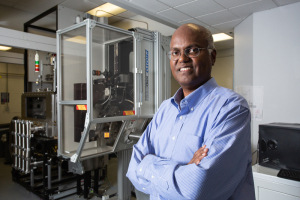Venkat Selvamanickam, M.D. Anderson Chair professor of mechanical engineering at the University of Houston, has been named a 2019 Fellow of the Institute of Electrical and Electronics Engineers (IEEE). The honor is in recognition for 32 years of research contributions in applied superconductivity, specifically the development and manufacturing of superconductor wires.
The appointment is the IEEE’s highest grade of membership and is reserved for those with “an outstanding record of accomplishments” in an IEEE field. No more than one-tenth of 1 percent of IEEE’s voting members can be named fellows in a given year.
Selvamanickam, who earned a master’s degree in mechanical engineering and a Ph.D. in materials engineering from the UH Cullen College of Engineering, is one of the world’s leading experts on innovative manufacturing technologies related to superconductors.
He is the co-founder and the former officer of SuperPower Inc., which produces superconducting electrical wire, and has continued his research since joining the UH faculty in 2008. He is also the director of the Advanced Manufacturing Institute at UH and the director of the Applied Research Hub at the Texas Center for Superconductivity at UH (TCSUH).
Selvamanickam's groundbreaking research demonstrated a unique technology to fabricate thin film high temperature superconductor (HTS) wire over length scales of more than a kilometer. Using this novel manufacturing process, his team completed the world's first significant delivery of thin film HTS wire for the Department of Energy’s flagship program of Albany Cable Project to power 25,000 households in Albany, N.Y.
The wire is now used by more than 200 institutions around the world for developing applications in various fields, including wind generators, energy storage, power transmission cables, magnetically levitated trains, medical imaging and defense.
He also led a highly successful program funded by the Advanced Research Projects Agency-Energy (ARPA-e) to achieve four-fold improvement in in-field performance of superconductor wires. Currently, Selvamanickam is leading a program funded by the Advanced Manufacturing Office of the DOE to develop advanced manufacturing technologies for superconductor wires for next-generation electric machines.
Selvamanickam's research at the University spans a wide range of advanced processing techniques for high-performance materials for energy and electronics applications such as high temperature superconducting thin film wires, photovoltaics and flexible electronics.
“We are working to overcome the obstacles to commercialization of high temperature superconductor wires through a number of projects from nanoscale materials engineering to large-scale manufacturing research,” he said.
Selvamanickam earned the Presidential Early Career Achievement (PECASE) Award in 1996. This is the highest honor bestowed by the U.S. Government on outstanding scientists and engineers beginning their independent careers. He has also received three R&D 100 awards, the Superconductor Industry's Person of the Year award, Wire and Cable Technology International Award and the IEEE Dr. James Wong Award for Continuing and Significant Contributions to Applied Superconductivity Materials Technology. Prof. Selvamanickam is a Fellow of the U.S. National Academy of Inventors.
He has published 240 papers and holds over 80 issued patents. He serves as an associate editor of IEEE Transactions of Applied Superconductivity.
“I would like to thank the support of my colleagues, collaborators, sponsors and the University of Houston over 32 years for this exhilarating experience in the field of applied superconductivity,” Selvamanickam said. “I am grateful especially to my peers who spent their valuable time in preparing and supporting my nomination and to the IEEE Council on Applied Superconductivity and the entire IEEE Institution for this honor.”
IEEE is the world’s leading professional association for advancing technology for humanity. Through its 400,000 plus members in 160 countries, the association is a leading authority on a wide variety of areas ranging from aerospace systems, computers and telecommunications to biomedical engineering, electric power and consumer electronics. To learn more about IEEE or the IEEE Fellow Program, please visit www.ieee.org.
